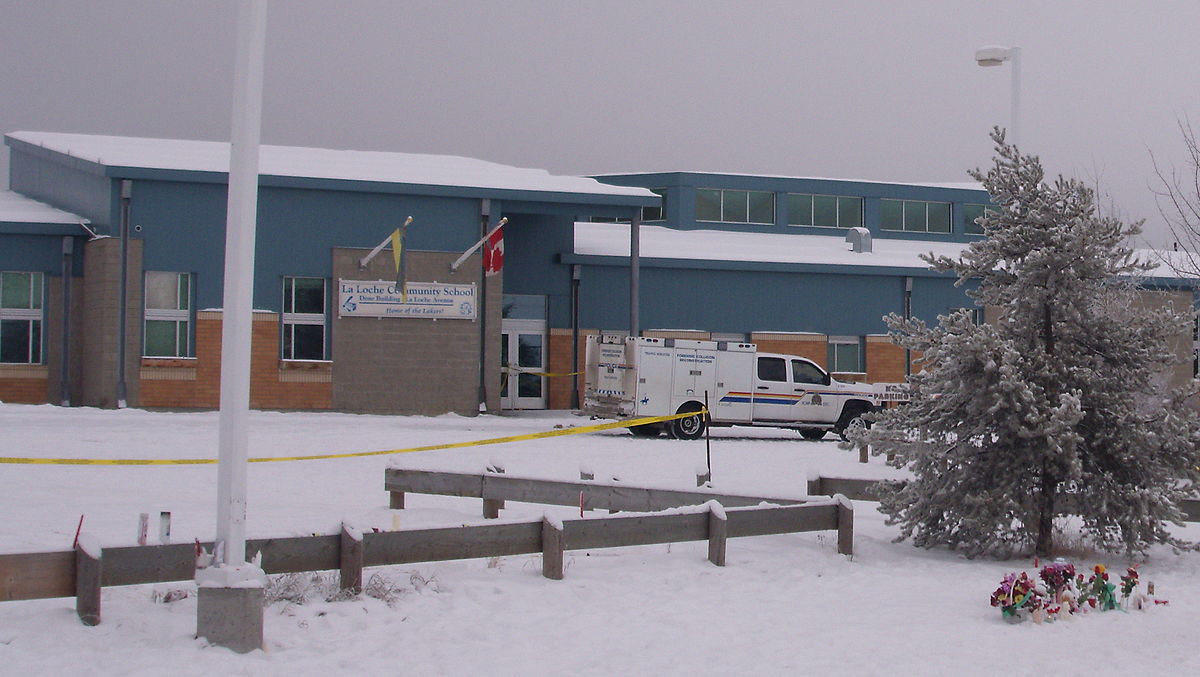Breaking
‘Poor moral judgment:’ Hearing told La Loche shooter has PTSD, suicidal thoughts

Dene Campus of the La Loche Community School on January 24. (Photo by Kayoty – Own work, CC BY-SA 4.0.)
MEADOW LAKE, Sask.—A psychiatrist says that a teenager who gunned down four people in northern Saskatchewan has symptoms of post-traumatic stress disorder and flashbacks which have led to suicidal thoughts.
Dr. Mansfield Mela testified in court Thursday that the flashbacks were “quite incapacitating” for the teen, who needed medication because “he couldn’t sleep from the images.”
“He was becoming more hopeless and the images were quite distressing to him,” Mela said at a sentencing hearing to determine if the teen will be sentenced as an adult or a youth.
Crown prosecutor Lloyd Stang questioned how the teen fit the diagnosis of PTSD when one of the symptoms is avoidance of thoughts or conversation about the traumatic event.
Stang noted that the teen drew pictures shortly after the January 2016 shooting in La Loche, one of which depicted two graves for victims Dayne and Drayden Fontaine and another open grave for himself.
But Mela said that drawing wasn’t a memory from the event, so it didn’t count as avoidance, and Mela stood by his PTSD diagnosis.
Mela also said the teen has an intellectual disability, major depressive disorder and displays signs of fetal alcohol syndrome.
“He has poor reasoning, poor problem-solving and poor intellect,” Mela told the hearing being held in Meadow Lake, Sask.
He said the teen’s mental age at the time of the January 2016 shooting in La Loche was closer to that of a 12-year-old than a 17-year-old.
The teen killed the Fontaine brothers in a home before shooting up the high school where teacher Adam Wood and teacher’s aide Marie Janvier died. Seven others were hurt.
The teen — who cannot be named since he was just shy of his 18th birthday when the shooting occurred — pleaded guilty last fall to two counts of first-degree murder, two counts of second-degree murder and seven counts of attempted murder.
Mela said he asked the teen during several interviews why he carried out the shooting, but did not get a specific answer.
“He consistently indicated that he wasn’t thinking. He did not know why he wanted to do what he did.”
Mela said the teen seemed to make the decision to shoot up the school “without thinking about the consequences.”
Mela’s testimony contradicts that of child psychiatrist Dr. Declan Quinn, who testified for the Crown this week and said the teen “did not come across as being clearly developmentally delayed or slow.”
However, the teen described himself as “quite unhappy and quite depressed and very anxious,” Quinn said.
Clinical psychologist Dr. Katelyn Harker also testified for the Crown and said the teen told her that he was thinking about shooting up the school for six months. But he didn’t tell her why.
Harker said she believes the teen has some cognitive limitations, but no disorder.
The teen’s aunt testified Thursday afternoon that she wasn’t aware of him having any trouble at school.
In the weeks before the shooting, “he was the same quiet boy,” she said.
“There was nothing out of the ordinary,” she said.
Court heard that the aunt and other family members often visit the teen at the youth detention centre in Saskatoon where he has been held since shortly after the shooting.
They have not talked about that day in January 2016, she said.
“I guess we just don’t want to go back and re-imagine all the things that happened,” the aunt said.
She said before the shooting, it was hard to keep a conversation going with the teen, but that he has changed while in custody.
“As soon as we greet him, he gives us a hug…He’s probably never given a hug before,” she said.
The defence is expected to call its last witness, a psychiatrist, to testify Friday.





















